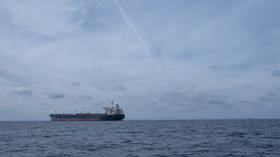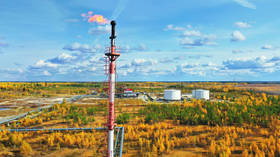Most Russian oil exports bypassing price cap – FT

The EU and G7 countries have largely failed to enforce a $60 per barrel price cap on Russian seaborne oil exports, Financial Times reported on Monday, citing an analysis of shipping and insurance records.
In August, around three-quarters of Russian oil was reportedly being shipped overseas without Western insurers, which was considered one of the tools helping to limit the price at which Russian crude was being sold on the global market.
About half of Russian oil exports did not use Western insurance services during the entire spring, according to Kpler data, as cited by the media, suggesting Moscow “is becoming more adept at circumventing the cap.”
Meanwhile, global prices for crude are on the rise, nearing 13-month highs. Brent futures for November delivery were trading at $93.51 per barrel on Monday, while US West Texas Intermediate crude (WTI) climbed above $90 per barrel. Russian crude was no exception, with the Far Eastern blend ESPO trading at over $88 per barrel, and with Urals crude above $78 per barrel.
In June, US Deputy Treasury Secretary Wally Adeyemo claimed that the price cap imposed by the Western allies in December was working as intended.
“In just six months, the price cap has contributed to a significant decline in Russian revenue at a key juncture in the war,” he said.
In August, Acting US Assistant Treasury Secretary Eric Van Nostrand said that he was “confident that the price cap is achieving its twin goals of restricting Russian revenues while helping stabilize energy markets.”
According to FT, Russian, Chinese, and Indian insurers have stepped in to replace Western majors, while a “dark fleet” of tankers, built for transporting Russian crude around the world, has helped Moscow to avoid Western insurers and shippers.
For more stories on economy & finance visit RT's business section














